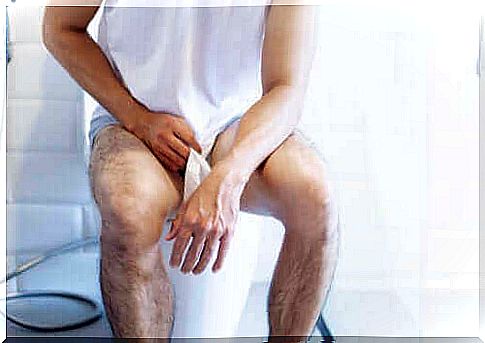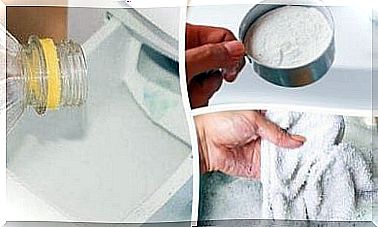Symptoms Of Cystitis In Men

Cystitis refers to inflammation of the bladder. Although it is a fairly frequent condition in women, men can also fall victim to this type of infection. How do you recognize a bladder infection in men?
The symptoms do not differ much between men and women. However, it is important to be alert to the evolution of the infection. Generally, this infection affects men between the ages of 15 and 50.
While usually not serious, it is uncomfortable and can sometimes be a sign of other illnesses. Below we tell you what you need to know about a bladder infection in men.
A bladder infection in men
Urinary tract infections in men can affect the lower urinary tract (especially the bladder) as well as the upper urinary tract and kidneys. The term “cystitis” refers to a urinary tract infection involving the bladder and lower urinary tract.
In general, when we talk about a simple, acute cystitis, we mean an infection that affects only the bladder, but not the rest of the urinary tract of the kidneys. This is an important distinction because it completely changes the treatment of patients and its prognosis.
Symptoms of a bladder infection in men
In men, bladder infections are not as common as in women, since men have an anatomically longer urethra. This makes it more difficult for pathogens to reach the bladder.
At the same time, according to a publication of the National Center for Biotechnology Information (English link) also result from antibacterial defenses derived from the prostatic fluid.
In most cases, this infection does not cause any complications and the symptoms are similar to those of women. In general, the symptoms of a bladder infection in men include the following:
- Dysuria (English link): This refers to pain while urinating. Patients may experience it as a burning or stinging sensation.
- Frequency of urination: An increase in the number of times a person urinates.
- The urgency to urinate: in other words, a sudden need to urinate or an inability to hold urine.
Other less common symptoms include:
- Suprapubic pain.
- Nocturia, which refers to urination that is more frequent at night than during the day.
- Difficulty in expelling the urine stream.
- Hematuria (blood in the urine).

Possible complications
When men experience recurring cystitis symptoms, or the symptoms appear along with pelvic or perineal pain and fever, it’s best to consider the possibility of prostatitis. Therefore, doctors should evaluate whether to refer the patient to a specialist in urology.
At the same time, the presence of fever, chills, fatigue and tenderness in the flank or costovertebral angle is not appropriate when it comes to simple acute cystitis in men. In the case of these clinical manifestations, patients can really deal with pyelonephritis.
The correct diagnosis of cystitis is essential when it comes to prescribing the right antimicrobial treatment and avoiding complications. A doctor will determine if the symptoms are due to a bladder infection or other pathology.
Diagnostics
To diagnose a bladder infection in men, a doctor starts with a comprehensive list of questions about symptoms. By doing so, he or she will determine whether additional investigations are needed, including the following:
- Urine analysis: Doctors perform this through a microscope or by using a reactive strip to detect pyuria.
- Urine culture: Doctors may order a urine culture using antibiotic sensitivity data. A gram stain can be helpful when it comes to choosing empirical antibiotic therapy pending culture results. Next, doctors will observe the presence of bacteriuria. In general, doctors will always perform this test in the case of a suspected bladder infection in men. They will never prescribe a course of antibiotics without first collecting a sample for a urine culture.
- Other investigations: Doctors will perform a cautious digital rectal exam if they suspect acute prostatitis. A sensitive and edematous prostate will confirm this alternative diagnosis.
In men who have a bladder infection, especially those with recurrent urinary tract infections caused by the same strain of bacteria, doctors will consider the diagnosis of chronic prostatitis.

Risk factors for more serious infections
Certain specific features can increase the chances of a person developing a more complicated acute urinary tract infection. Therefore, doctors should pay special attention when treating patients with the following characteristics:
- Urinary tract abnormalities: nephrolithiasis, stenosis, stents, or urinary diversions.
- Immunocompromised patients: neutropenia or advanced HIV infection.
- Poorly controlled diabetes mellitus.
What to do with urinary complaints
As we mentioned, the development of cystitis in healthy men, under the age of 50 and not suffering from any other condition, is low. However, after the age of 50, the risk increases, given the prostatic hypertrophy that some seem to develop.
If urinary symptoms are present, the person concerned should consult a doctor as soon as possible. This prevents delays in diagnosis and allows doctors to administer the appropriate treatment. At the same time, doctors should monitor the evolution of the infection along with the results of the urine culture.
In certain cases, doctors must evaluate both the entire urinary tract and the prostate. In the latter case, the nephrologist or urologist is responsible for the examination.
Finally, we should mention how important it is to have a healthy lifestyle and drink plenty of water. These factors help prevent this type of infection from coming back.









